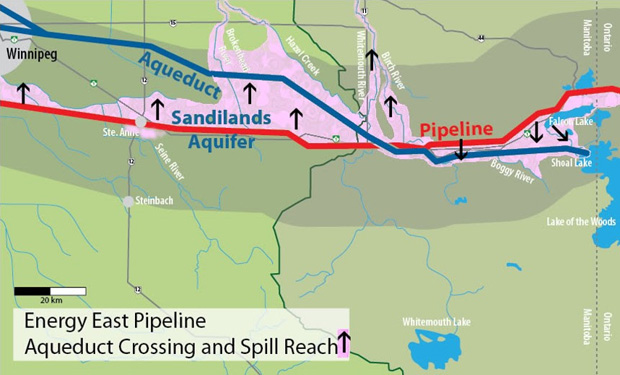Rethinking Lifestyle
A New Energy Economy

We are beginning a series of articles focusing on “A Path to a New Energy Economy” where we want to introduce the issues around the proposed Energy East pipeline. This pipeline will pass very close to Isle de Chenes, Landmark and Ste. Anne. The series will conclude with a free public lecture about the proposed pipeline on February 15, 2017 at the Jake Epp Public Library.
A new energy economy is necessary, attainable and desirable. Our current extensive dependence on fossil fuel energy makes us vulnerable to price and supply changes as well as to weather and climate changes. All this affects our well-being. Inevitably we are reluctant to change to this new energy economy because change is difficult, especially if the status quo is working so well for us. How well do we understand the potential benefits as well as the risks of continuing with the status quo?
There are many reasons for the difficulty with change, I will mention two. First, a change to a new energy economy will take a long time; we need time to build new infrastructure and we time to train ourselves in this new way of powering our economy. Second, the fossil fuel industry is being subsidized to the tune of $1 billion per year making alternatives relatively more expensive and reducing the research and investment into alternative energy sources.
Jeff Rubin in his new book “The Carbon Bubble” says that Canada, in the last 10 years, has pinned its hopes on becoming an energy superpower. We already know that bubble has burst. Jeff Rubin goes on to say that we should look at the opportunities the new energy economy will provide to us. In western Canada that is food production. Many places have the technology to produce food but lack two essential requirements: land and water. These two requirements western Canada has in abundance.
But we just said that the transition to a new energy economy will take a long time. What do we do while we are in this transition?
Do we allow and even promote the proposed Energy East pipeline which according to TransCanada’s website claims will supply eastern Canada with Canadian energy while we transition to a new energy economy? Or do we believe the National Energy Board’s website which claims the project will include marine facilities in St. John, NB that enable access to other markets by ship; that is: exports. If the Energy East pipeline is for the export of oil, do we support that? Is the poster “Our risk, their profits” as the protesters proclaim, accurate?
And then there is the matter of fossil fuel transportation. During this transition period, fossil fuels will for sure need to be transported. What is the safest method of transporting them? Pipeline, rail, highway or sea?
In Manitoba, where does our energy come from? If the Energy East Pipeline does not happen, what impact would that have on Manitoba? What are the opportunities to produce new energy in Manitoba? How well suited are we to provide affordable, renewable energy?
These fundamental questions need to be addressed for our own long term well-being. Certainly they need to be addressed by the experts, and they will be addressed by our politicians but they also need to be addressed by an interested public. This public has everything to lose if we get it wrong but everything to gain if we get it right.




